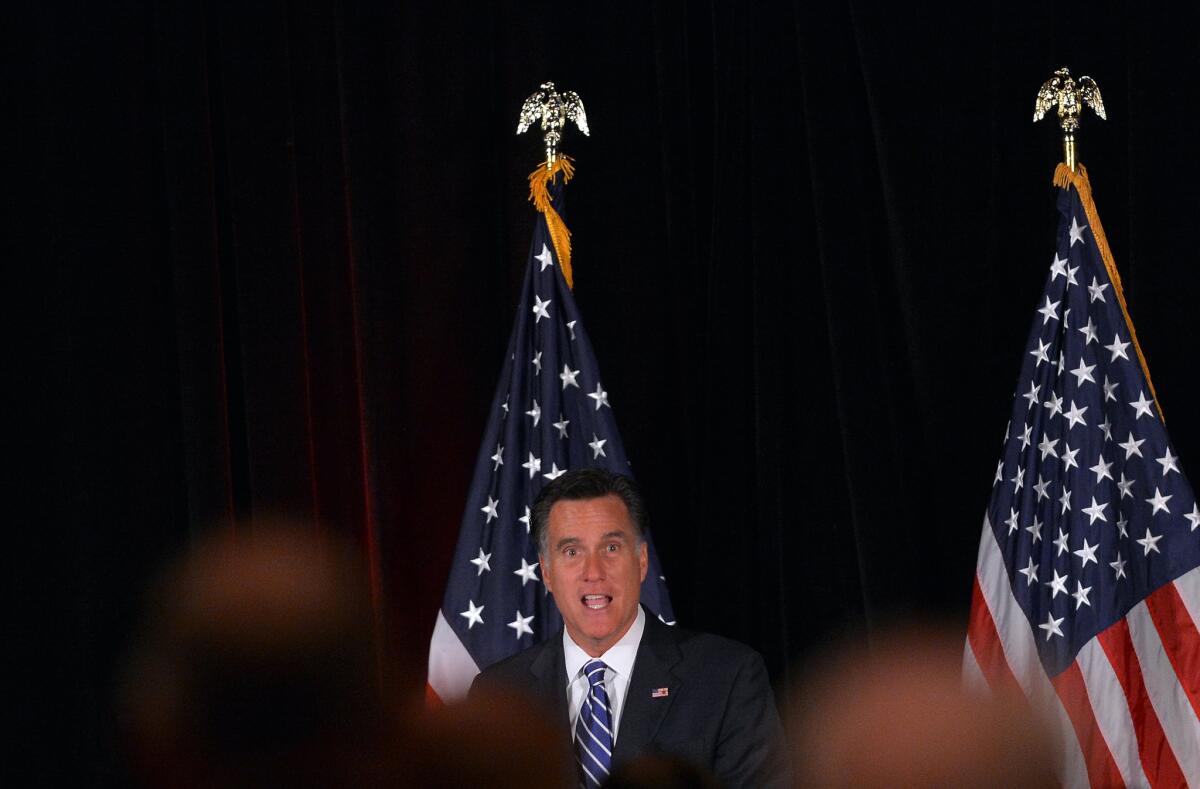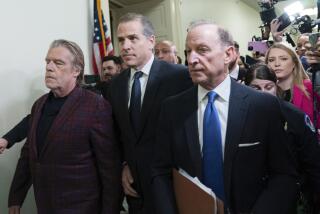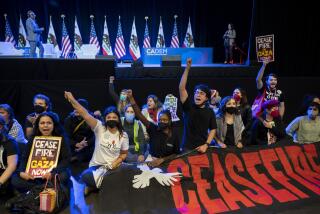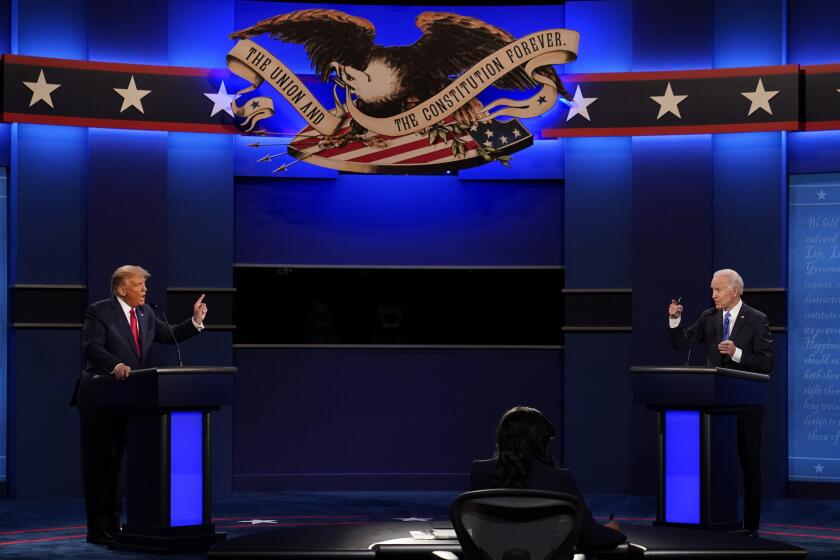Opinion: Did the Benghazi committee avenge Mitt Romney? Not quite

US Republican presidential candidate Mitt Romney speaks during a fundrising event in Washington, DC, on September 27, 2012.
There was a ghost at Thursday’s hearing of the House Select Committee on Benghazi.
His spectral presence was especially palpable when committee Republicans claimed to produce a smoking gun showing that Hillary Rodham Clinton was publicly blaming the Sept. 11, 2012, attacks there on outrage over an anti-Islamic YouTube video while privately conceding that they were the work of an Al Qaeda-like group.
The ghost is Mitt Romney, the 2012 Republican candidate for president.
It was Romney who first contended that the Obama administration initially denied that the attack in Benghazi was an act of terror for fear that it would sully the president’s reelection claim that he had “decimated” Al Qaeda. (Actually, Obama had said that “we’ve decimated Al Qaeda’s top leadership in the border regions around Pakistan.”)
During an Oct. 16 presidential debate with Obama, Romney said of Benghazi: “There was no demonstration involved. It was a terrorist attack, and it took a long time for that to be told to the American people.”
Obama replied: “The day after the attack, Governor, I stood in the Rose Garden and I told the American people ... that we are going to find out exactly what happened. That this was an act of terror and I also said that we’re going to hunt down those who committed this crime.”
Romney: “I think [it’s] interesting the president just said something, which is that on the day after the attack he went into the Rose Garden and said that this was an act of terror.... I want to make sure we get that for the record because it took the president 14 days before he called the attack in Benghazi an act of terror.”
Obama: “Get the transcript.”
Then the debate’s moderator, CNN’s Candy Crowley, burst Romney’s balloon by saying that Obama “did call it an act of terror.”
Actually, what Obama said on that occasion was that “no acts of terror will ever shake the resolve of this great nation.” The context was clear, but Republicans insisted that Obama’s words weren’t explicit enough.
Even so, the damage had been done. Romney had blown what many Republicans thought was a golden opportunity to tarnish Obama’s record on fighting terrorism and his reputation for truthfulness.
Elephants remember. So fast-forward to 2015, when Romney’s fellow Republicans bring Clinton, the likely 2016 Democratic nominee, before their select committee.
Did the committee avenge Romney? Some commentators seem to think so, pointing to a newly discovered email sent by Clinton to her daughter Chelsea on the night of Sept. 11, the day of the Benghazi siege, in which the secretary of State said the compound in Benghazi was attacked by an “Al Qaeda-like group.”
But wait, there’s more! On the day after the attack, Clinton told Egypt’s prime minister in a phone call that the “attack in Libya had nothing to do with the film. It was a planned attack -- not a protest.”
And yet, as Rep. Jim Jordan (R-Ohio) pointed out in questioning Clinton, on the night of Sept. 11 she had issued this statement: “Some have sought to justify the vicious behavior as a response to inflammatory material posted on the Internet.”
That proved, Jordan said, that Clinton was telling the American people one thing but her family “an entirely different story.”
A smoking gun? Not quite.
Clinton told the committee that “I used those words deliberately, not to ascribe a motive to every attacker but as a warning to those across the region that there was no justification for further attacks.” A lawyerly answer, but no more nitpicking than the Republican objections to Obama’s account of his Rose Garden remarks.
Clinton also said that “there was a lot of conflicting information that we were trying to make sense of.”
The idea that at least some of the attackers in Benghazi were inspired by protests over the video was still current in intelligence circles three days after the attacks. The first draft of “talking points” prepared by the CIA, dated Sept. 14, said: “We believe based on currently available information that the attacks in Benghazi were spontaneously inspired by the protests at the U.S. Embassy in Cairo and evolved into a direct assault against the U.S. Consulate and subsequently its annex.”
But those talking points also said this: “We do know that Islamic extremists with ties to Al Qaeda participated in the attack.” (That statement later morphed into a reference to generic “extremists.”)
In other words, the attacks could be both an example of terrorism and influenced by outrage over the video -- a seemingly simple concept Republicans still can’t wrap their heads around.
To this day, some people believe that outrage over the video was a factor in at least some of the violence in Benghazi. In a major investigative report published in December 2013, the New York Times reported that “contrary to claims by some members of Congress, [the attack] was fueled in large part by anger at an American-made video denigrating Islam.”
Clinton alluded to that possibility at the hearing, noting that “the man that has been arrested as one of the ringleaders of what happened in Benghazi, Ahmed Abu Khattala, is reported to have said it was the video that motivated him.”
None of this, of course, contradicts the more modest version of the Romney-House Republican thesis -- that Clinton and other Obama administration officials publicly chose to focus on the possible role of outrage over the video and continued to emphasize that angle after it had been called into question. In other words, they engaged in some election-year political spin.
That is very different from alleging either that administration officials concocted the idea of a connection to protests over the video or that Obama and Clinton tried to pretend that this wasn’t an act of terrorism.
Like the defeated presidential candidate who haunted the hearings, the House Republicans overreached in making their own political capital out of the deaths of four Americans. Like Romney, they don’t realize that, in attacking the other party, sometimes less is more.
Follow Michael McGough on Twitter @MichaelMcGough3
More to Read
A cure for the common opinion
Get thought-provoking perspectives with our weekly newsletter.
You may occasionally receive promotional content from the Los Angeles Times.







